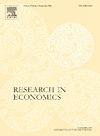ESG disclosure and labour investment efficiency
IF 1.2
Q3 ECONOMICS
引用次数: 0
Abstract
This study examines the impact of environmental, social and governance (ESG) disclosure on firms’ labour investment efficiency. Our results indicate that such impact is positive. ESG disclosure is more effective in curtailing over-hiring and when over-investment in physical capital is high. The uncovered positive association is mainly fuelled by the volume of social and governance disclosure (environmental disclosure barely affects labour investment efficiency), and is more pronounced for firms with a weaker corporate social responsibility performance. The results from the empirical analysis survive a battery of robustness tests, including the use of alternative measures to capture labour investment efficiency, different control variables in regression models, and controlling for endogeneity in ESG disclosure. Our analysis and findings are novel to the literature and contribute to ongoing debates about the impact of ESG disclosure on firms’ performance and about potential benefits and costs of mandatory disclosure.
ESG信息披露与劳动投资效率
本研究考察了环境、社会和治理(ESG)信息披露对企业劳动投资效率的影响。我们的结果表明,这种影响是积极的。ESG信息披露在减少过度招聘和实体资本过度投资较高时更为有效。被发现的正相关主要是由社会和治理披露的数量推动的(环境披露几乎不影响劳动投资效率),并且在企业社会责任绩效较弱的企业中更为明显。实证分析的结果经受住了一系列稳健性测试,包括使用替代措施来捕捉劳动投资效率,回归模型中的不同控制变量,以及控制ESG披露的内生性。我们的分析和发现对文献来说是新颖的,并有助于正在进行的关于ESG披露对公司绩效的影响以及强制性披露的潜在收益和成本的辩论。
本文章由计算机程序翻译,如有差异,请以英文原文为准。
求助全文
约1分钟内获得全文
求助全文
来源期刊

Research in Economics
ECONOMICS-
CiteScore
1.40
自引率
0.00%
发文量
37
审稿时长
89 days
期刊介绍:
Established in 1947, Research in Economics is one of the oldest general-interest economics journals in the world and the main one among those based in Italy. The purpose of the journal is to select original theoretical and empirical articles that will have high impact on the debate in the social sciences; since 1947, it has published important research contributions on a wide range of topics. A summary of our editorial policy is this: the editors make a preliminary assessment of whether the results of a paper, if correct, are worth publishing. If so one of the associate editors reviews the paper: from the reviewer we expect to learn if the paper is understandable and coherent and - within reasonable bounds - the results are correct. We believe that long lags in publication and multiple demands for revision simply slow scientific progress. Our goal is to provide you a definitive answer within one month of submission. We give the editors one week to judge the overall contribution and if acceptable send your paper to an associate editor. We expect the associate editor to provide a more detailed evaluation within three weeks so that the editors can make a final decision before the month expires. In the (rare) case of a revision we allow four months and in the case of conditional acceptance we allow two months to submit the final version. In both cases we expect a cover letter explaining how you met the requirements. For conditional acceptance the editors will verify that the requirements were met. In the case of revision the original associate editor will do so. If the revision cannot be at least conditionally accepted it is rejected: there is no second revision.
 求助内容:
求助内容: 应助结果提醒方式:
应助结果提醒方式:


